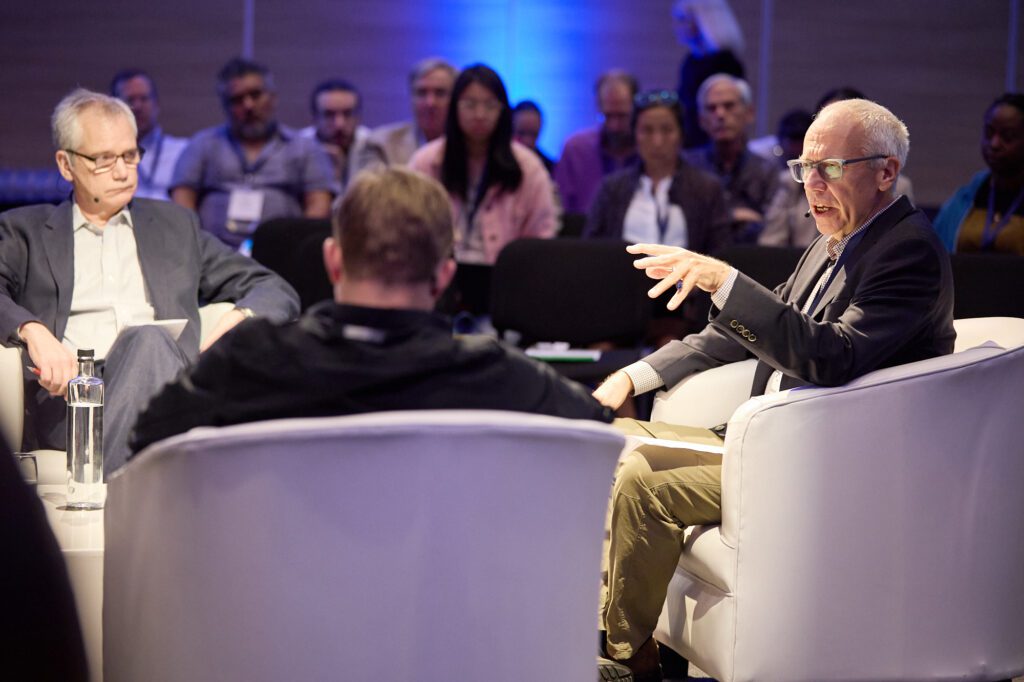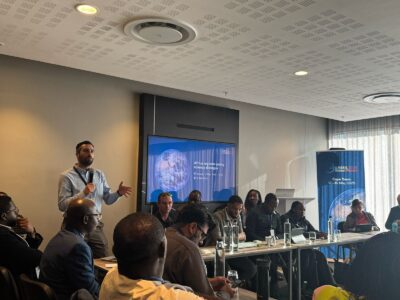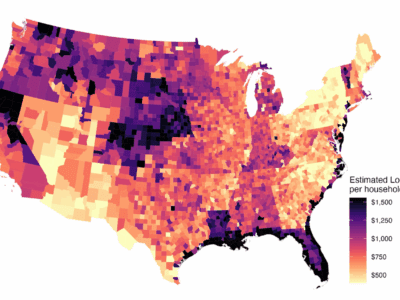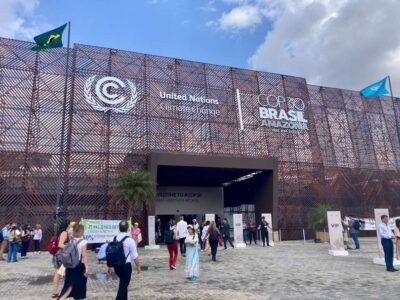A Landmark Geoengineering Conversation in the Global South
The UCLA Emmett Institute helps sponsor and organize the Degrees Global Forum, the largest event of its kind to date.

I post periodically about developments in the debate over solar geoengineering (SRM) and its potential role in response to climate change. News accounts may suggest that this debate moves fast, but it has three enduring, large-scale themes. First, SRM presents high stakes for climate risks and response – which most governments thus far have been reluctant to acknowledge. Second, it is crucial to build effective and legitimate capacity for global governance of these capabilities, including how they may interact with efforts to cut emissions and adapt to climate change. And third, nations of the Global South are likely to play an influential, perhaps crucial, role in developing this governance, for both politically pragmatic reasons and moral ones.
Touching on all these themes, a recent meeting in South Africa – the Degrees Global Forum, held in Cape Town from May 12 to 16 – was a crucial landmark in advancing global dialogue on SRM. The Forum represented several firsts in debate on SRM, the largest event to date, with the broadest global participation, and the first such meeting located in, and with a majority of participants from, the Global South. It may well mark the start of a truly global conversation on SRM.
The Forum was convened by the Degrees Initiative, which supports scientific research on SRM by researchers in the Global South – now 35 research teams in 21 countries. The Forum and adjoining events convened five days of intensive conversations on the science, technology, ecological and social impacts, public perceptions, communication, law, governance, and ethics of SRM – with more than 100 presenters from 35 countries.
Beyond the numbers, this change in the scale and breadth of participation brought a subtle but profound transformation in the character of the debate. While past conversations on SRM have been dominated by similar groups of long-engaged individuals and institutions, mostly senior and mostly from a few industrialized countries, this one was mostly new people, including a surge in participation of young people and youth-based organizations and a wide, diverse range of forceful, expert voices from across the Global South.
This new scale and breadth of participation had a subtle but profound effect on the conversations, which were more open, integrative, and pragmatic than I’ve heard previously on this subject. Notably, while conversations on SRM have for years involved a great deal of apologizing for even talking about SRM – a reaction, I suspect, to the distress many participants feel at the severity of climate risks and ongoing shortfall of other responses that make the conversation necessary, and to the persistent criticisms and attacks directed against it – that was much less in evidence here. This tone of agonized apology did not, fortunately, flip to uncritical enthusiasm for SRM. Rather, conversation was marked by widespread recognition of the importance of honestly addressing the topic, and acute awareness of the two sides of SRM’s high stakes – its potential to bring large benefits, and its insufficiency as a climate response with associated uncertainties, limitations, and governance challenges. There was a clear and widely shared ambition, for practical, evidence-informed inquiry and debate on the crucial question: what role, with what limitations or risks, can SRM play in addressing the totality of grave climate-related risks?
The Emmett Institute has a close and long-standing relationship with Degrees, dating back to my service on the 2011 working group that launched an earlier governance initiative that later evolved into Degrees. Former Emmett research fellow Jesse Reynolds now serves as Chief of Staff of Degrees, following his service as Executive Secretary of the Climate Overshoot Commission. I and former fellow Holly Buck, now a faculty member at the University of Buffalo, both serve as research collaborators for Degrees.
The Global Forum provided an opportunity to deepen the Emmett Institute’s partnership with Degrees. As a major supporter of the Forum, we contributed to multiple sessions, including a plenary session I organized on anticipating coming SRM governance needs, with comments by Andrew Light, former US Assistant Secretary of Energy for International Affairs; Cynthia Scharf of the Centre for Future Generations; and Jeroen Oomen of Utrecht University.

The most exciting role for Emmett in the Forum, however, was being invited to convene and prototype the first Latin American regional policy-science dialog on SRM. Held one day before the Forum, this dialog brought together Degrees-supported researchers from across Latin America with policymakers from the region, in an informal conversation to start the process of familiarizing regional policymakers with the state of knowledge and capability on SRM, help researchers understand policymakers’ knowledge needs, and start to build regional networks to continue the dialog. Parallel regional dialogs were convened for Africa and Asia, with the three groups then joining to exchange insights across regions.
Emmett-affiliated researcher Juan Pablo Escudero Toro assembled a formidable group of highly engaged, respected, and well-connected officials and legislators from five countries in Latin America to join this dialog. SRM was new to these participants, and to their governments, but they immediately grasped its serious implications for their region. Indeed, several expressed alarm that an issue of such clear importance to their nations was so advanced and neither they nor their colleagues had ever heard of it. They dug in intensely and critically, at the regional dialogs and throughout the Forum. By the end of the Forum each regional group had already met again and made plans for continued networking and briefing with expanded networks of colleagues in their regions. We at Emmett thank Degrees and its founder Andy Parker, for their vision in pursuing this important work and for the opportunity to contribute at the Forum. Thanks are especially due to our colleague JP Escudero for working his magic to generate a remarkably effective deepening of the dialog on SRM on very short notice.
Readers of my prior posts will know there has been heated discussion over the appropriateness of discussing SRM, with some civil society groups and researchers even arguing against research and governance consultations. These controversies continued around the Forum, but in a way that gives a clear indication of the how the character of debate has changed. One group that has long rejected researching or discussing SRM issued a statement just before the Forum opening, criticizing its being held in Cape Town as a neocolonialist threat to Africa. A group of 30 African climate scientists issued a response a few days later, arguing the importance of their research to build capacity to understand SRM’s risks and benefits as an essential basis for informed African decisions. I urge the reader to read the two statements and assess their relative persuasiveness.
It is expected that similar Global Forums will continue, at roughly two-year intervals.
Reader Comments
2 Replies to “A Landmark Geoengineering Conversation in the Global South”
Comments are closed.







As solar electric panels convert solar into electricity rather than heating a surface and then the air, does this play any role in SRM?
A very small one. The overall brightness of the Earth’s surface is part of the energy balance that determines the surface temperature and climate. But the Earth’s surface is so enormous and human stuff occupies such a small part of it, that changes in the reflectivity of human-built stuff on the surface can make only a tiny difference in the global energy balance. Such changes can make an important difference locally — notably via “cool roofs” programs to lighten surfaces in urban areas (roofs, roads, parking areas) to reduce the extra local heating caused by dark built surfaces (asphalt, concrete, dark roofing materials) — but are too small to matter globally. The stronger connection between SRM and solar power actually goes the other way: dimming the sun even a small amount (1%) would make a similar reduction in the energy output of solar systems that depend on the direct beam radiation, such as concentrating systems that reflect sunlight to a tower. This does not apply, or applies much less, to flat-panel PV solar systems, which get much of their energy from diffuse sky radiation (which SRM would slightly increase) rather than the direct beam (which SRM would slightly decrease).